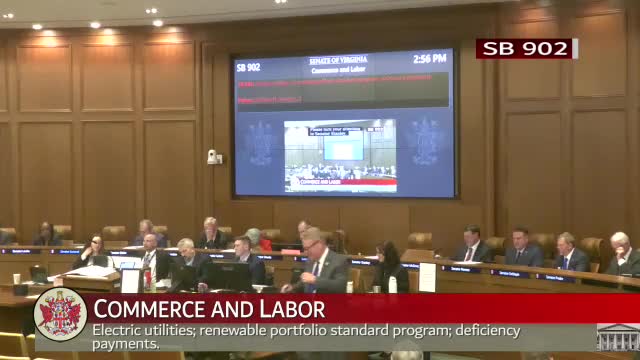Senators debate removing deficiency payments tied to renewable portfolio shortfalls; bill earns mixed response
Get AI-powered insights, summaries, and transcripts
Subscribe
Summary
SB 902 would eliminate statutory deficiency payments utilities must make when they miss renewable portfolio standard obligations under specified conditions; proponents argued timing and PJM queue constraints justify removing the penalty, opponents said the penalty is the core enforcement mechanism of the Virginia Clean Economy Act.
Senate Bill 902, sponsored by Senator Stanley, would remove provisions requiring certain electric utilities to make deficiency payments for missing Renewable Portfolio Standard (RPS) compliance obligations when the utilities cannot procure sufficient renewable energy certificates (RECs) or where REC pricing is unusually high. The bill prompted vigorous debate between trade groups, utilities, environmental advocates and the administration’s energy officials.
Sponsor testimony framed the change as a recognition of practical constraints: Secretary of the Department of Energy staff told the committee that while utilities have projects in PJM’s interconnection queue, long queue lead times (historically averaging seven years) and PJM processing constraints create supply delays that are beyond utilities’ control. The administration’s representative described forecasted deficiency payments in utility filings (one estimate mentioned approximately $450 million in 2025 for Dominion, as filed) and said deficiency payments would ultimately be passed through to ratepayers.
Proponents including the Virginia Manufacturers Association and other business groups argued removing the statutory penalty reduces a double burden on consumers and prevents ratepayers from absorbing costs for market timing and interconnection delays. “We don't have enough generation, not because of necessarily a utilities fault…it's all about timing,” said a representative from the Manufacturers Association.
Opponents including environmental groups, Advanced Energy United, Sierra Club and conservation organizations warned removing the deficiency payment would remove the central economic incentive for utilities to procure and retire RECs and thereby undercut the Commonwealth’s RPS goals. “This is a direct attack on the Virginia Clean Economy Act,” said a conservation advocate. Southern Environmental Law Center noted utilities have not yet paid penalties to date and that utilities also hold RECs banked that could cover shortfalls.
Committee members asked whether deficiency payments ultimately are borne by customers (witnesses said yes), and whether alternative policy designs could preserve incentives while avoiding excessive rate impacts. The committee ultimately moved a substitute motion to pass the bill by for the day (PBI) after debate; a subsequent procedural motion to recommit to committee for further study passed (vote recorded as Ayes 8, Noes 6, 1 abstention on substitute/PBI action earlier in the meeting).
